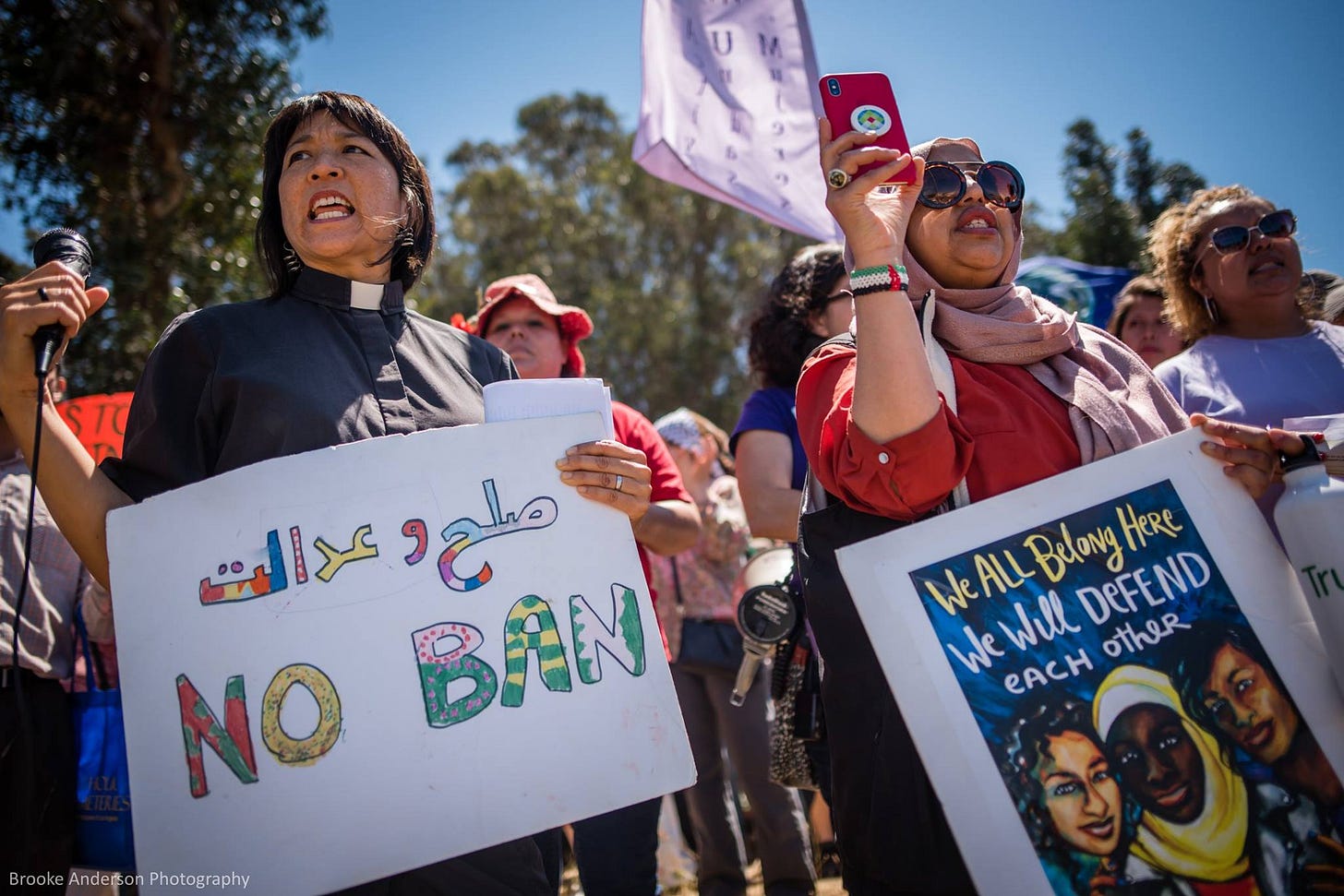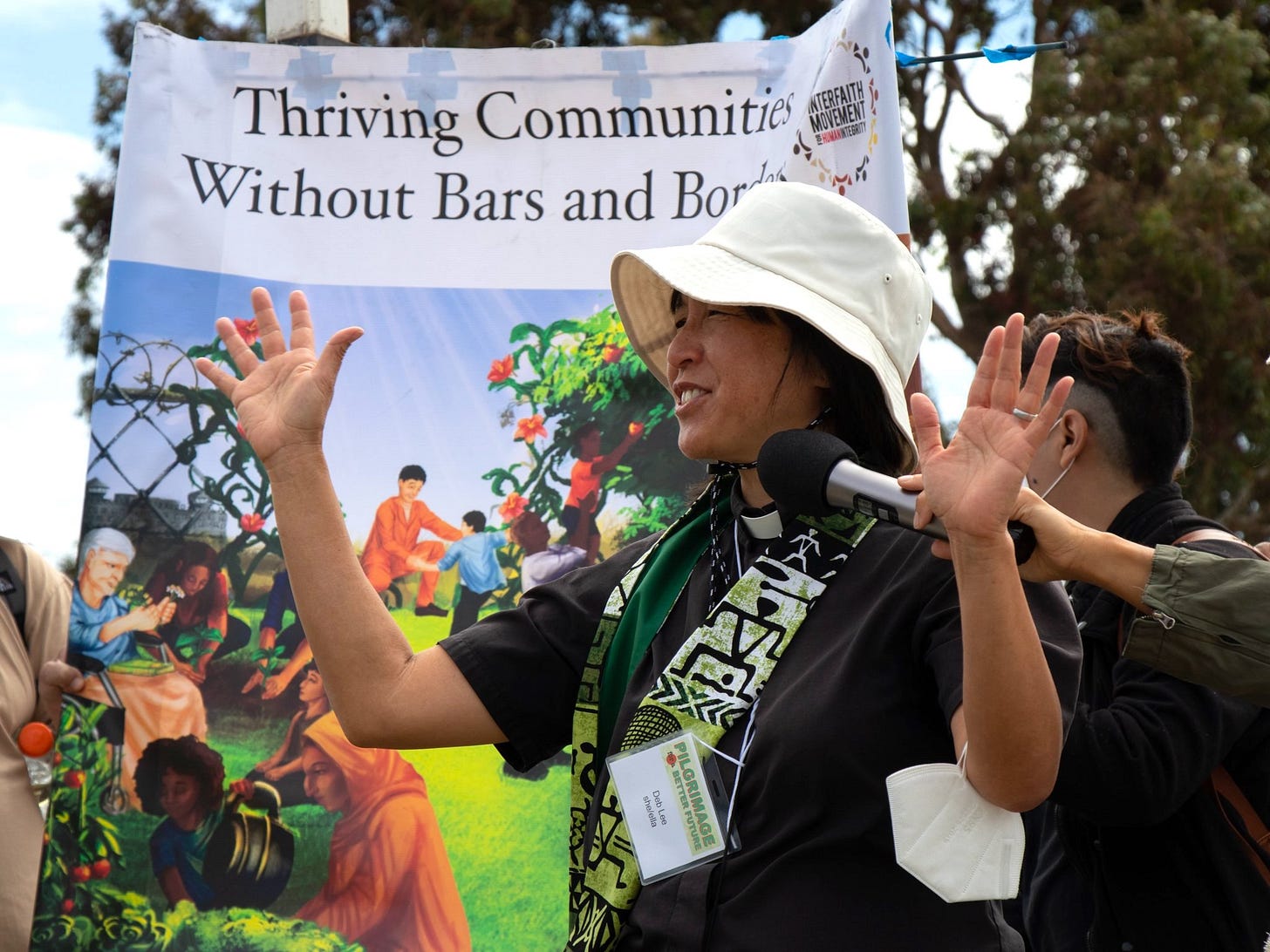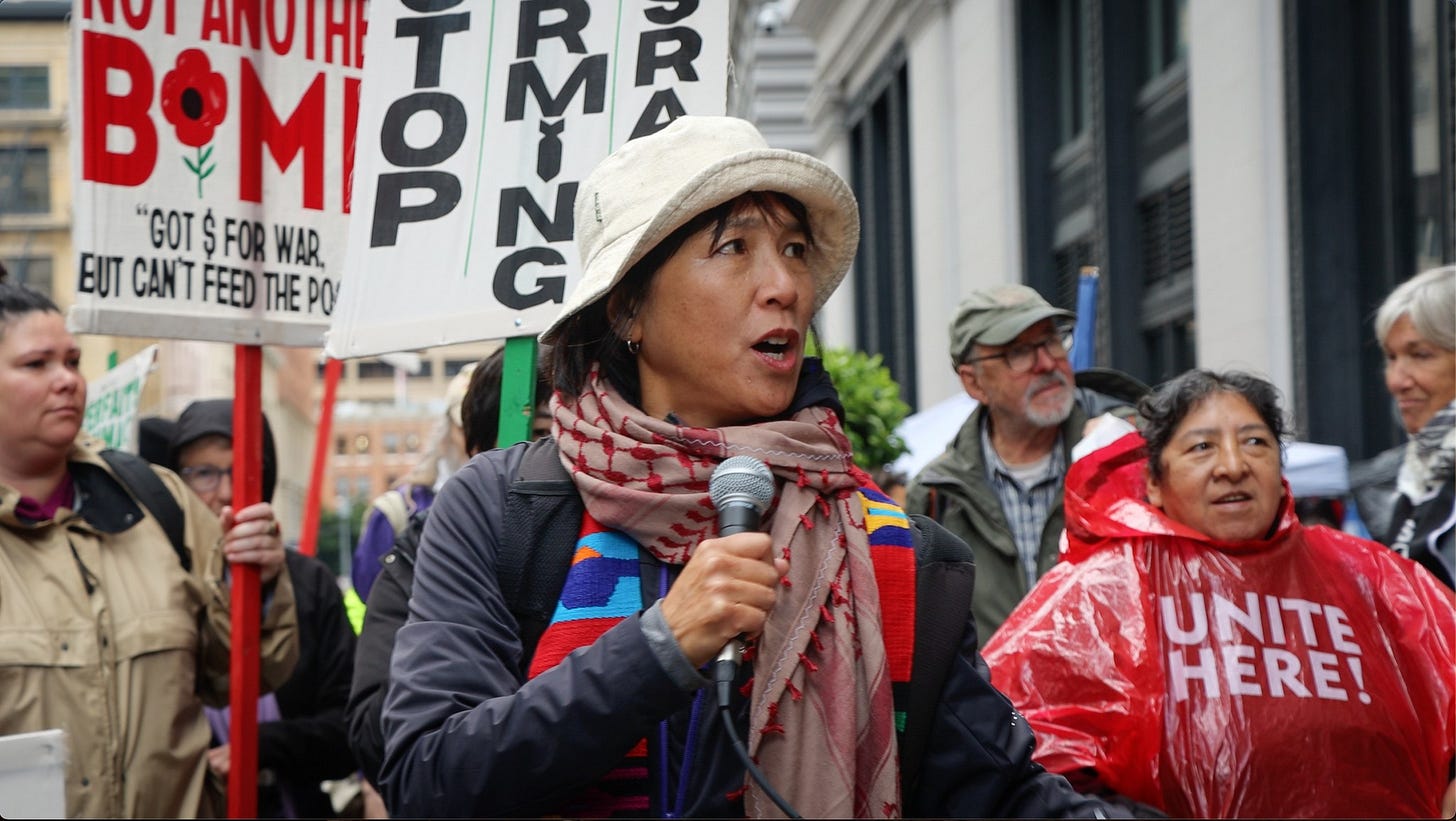Dear friends, in these times of overwhelming injustice, we need to inspire one another. With this month’s conversation, I am pleased to introduce someone who consistently inspires me. Rev. Deborah Lee lives her values through fierce and dedicated action, insightful analysis, and a deeply compassionate heart. I hope she will inspire you to find and live into whatever your own gifts may be.
For over 30 years, Rev. Deborah Lee has served at the intersection of faith and social justice. The daughter of Chinese immigrants, matters of race and citizenship have been a formative part of her life. Her work as an educator and organizer centers issues of race, gender, economic justice, anti-militarism, abolition, and immigration. She loves making connections, bridging different ethnic communities, generations, and geographies in creative and transformational ways.
I know Deborah through her role as director of the Interfaith Movement for Human Integrity (IM4HI). Affirming the dignity and sacredness of all people, IM4HI focuses on the interrelated struggles of immigration justice and ending mass incarceration.
Deborah is a co-founder of Women for Genuine Security, the US member of the International Women’s Network Against Militarism. Her many projects include co-producing the documentary, Along the Fenceline: Women Resisting Militarism and Creating a Culture of Life, co-editing Unfaithing US Colonialism, and contributing chapters to numerous other publications. Rev. Deborah is an ordained minister in the United Church of Christ (UCC).
After a bit of personal catching up, we ease into our interview. I begin by asking what the title of this blog, Healing Conversations from the Front Lines of Activism, means to her. “What first comes up for me,” she replies, “is how activism is healing, because it can be life-giving. It should be life-giving, meaning-making, and literally the work of trying to heal the planet, to heal brokenness in the world. They're mutually tied together. Activism is a seeking of healing… a way of trying to sow healing in the world.”
Her characterization of activism as life-giving is such a powerful contradiction to the stereotype, and to the experience of many of us who have felt the burnout and frustration of activist work. She nods, “Yeah. I've experienced that other kind of activism, and it doesn't feed my spirit. It's not a place where I can be my whole self, which is also being joyful and loving and spirit-filled. So I searched for an activism that could unite political strategy with spirit strategy, and deep integrity. When I've been able to see it, I felt the difference. That's what we've been trying to create through Interfaith Movement. But I have to credit the places where I experienced it, and got to learn and understand what that was.
“I first encountered it in the global south, where there was this powerful fusion of spirit and politics. And an understanding that campaigns are centuries long—like 500 years of decolonization. Seeing that in the context of the Philippines, in the context of Liberation Theology in South America, of meeting people through the Sanctuary movement of the '80s, when I was first coming into more of my political consciousness.
“I lived in Brazil for a few years, and so got to see how people were putting Liberation Theology and Creation Spirituality into practice. And I thought, when I go back to the United States, where does this spiritual liberation practice live? And it does live here. In every movement, there has been this spirit liberation strand. A lot of what I do is to ask, ‘What does it look like now? How do we keep that thread alive? How do we keep filling that stream?’ Because there's people hungering for that, just like I was. It's a mix of culture and spirit and political analysis, long view thinking and community.
“So that has been healing for me because I feel like all the pieces of my life, everything that I care about—my ancestors, my spirituality, my political yearnings— can all be in one. That in itself is healing. And to have a community of people as companions on the way.”
For almost 10 years Deborah was the program director at PANA, the Institute for Leadership Development and Study of Pacific Asian North American Religion, at Pacific School of Religion, and before that did similar work at the Pacific Asian Center for Theology and Strategies at the Graduate Theological Union. Their programs included engaging Pacific Islander, Asian, and Asian American theology students and faith communities in addressing issues like racial justice, civil liberties, feminism, LGBTQ+ rights, anti-militarism, and peacemaking in the Asia-Pacific region and in the US.
It was at PANA that Rev. Deb began practicing pilgrimage as an embodied integration of spirituality and social justice. She and a colleague led groups of seminary students and faith leaders on pilgrimages to Manzanar, the World War II incarceration camps for Japanese Americans. “That was very healing, doing pilgrimage as a form of consciousness raising about land and layers of history… as a form of prayer. And now when we do pilgrimages [at Interfaith Movement], we've taken that more into the community setting. It's also a form of activism.”
Their first pilgrimage at IM4HI was to Angel Island, on the 100th anniversary of the immigration detention center that operated there from 1910-1940. Deborah recalls, “We brought 400 people on the ferry who spoke English, Mandarin, and Cantonese. Some who lived in San Francisco for decades had never been there before. And there were some Chinese American survivors who had been incarcerated there as young children. That was one of the first immigration detention centers in the US, and now we have over 200, and growing.”
I invite her to talk more about the organization, Interfaith Movement for Human Integrity.
“By human integrity we mean the unity and oneness of all people,” she explains. “We're a California-based organization dedicated to the dignity and full inclusion of immigrants and people who've been impacted by incarceration, because those are two of the core civil rights and racial justice issues in our state, and in our country. So understanding those twin systems of criminalization, and seeing how the corporations that are profiting from each of those systems are the same corporations. Those two systems are structurally connected.
“If we understood race and criminalization, and the history of that in the United States, it was really the same ideology of white supremacy, and the ways communities of color are criminalized—just through different sets of laws and different ways to ‘other’ people, but basically to label people as criminals, to create fear, to stigmatize. It’s the same playbook.
“Our theme of ‘every person is sacred across bars and borders,’ means that the sacredness of people doesn't stop if someone was born on the other side of the border, goes to the other side of the border, or their parents came from the other side of the border. It doesn't stop, based on what papers they're carrying. Ultimately the sacredness and the dignity of every person has to be at the center of our policies, regardless of status, and also regardless of someone's worst mistake—what their criminal conviction was. We know that those things don't happen fairly at all, based on the color of your skin and the amount of money you have in the bank… But at the core, as people of faith, we have to see that people are sacred.”
She talks about how caging people—whether in prisons or detention centers—is a way to dehumanize, stigmatize, and separate them. “We don't get to hear their stories. We don't get to see them across the walls. We are literally being separated from the humanity of another person—and things get done in our name. Policies get justified. And we start losing our sense of responsibility, because we actually don't know the truth.”
IM4HI has done several pilgrimages traveling to all the ICE detention centers in California, and they held a regular vigil outside the West County Detention Facility. They have also done three pilgrimages to the southern border, each with a different focus.
In 2015, when there was an influx of Honduran migrants, Rev. Deb and her colleagues retraced the route—in reverse—going back to Honduras to seek a deeper understanding of the dynamics involved. “Other people would call it a delegation,” Deborah says, “but for us, we wanted to use a pilgrimage methodology, to have them be spiritual journeys that located our own stake in the game, our own motivation—spiritual motivations and personal motivations—as part of the journey, and part of the inquiry.”
I’m curious what insights Deborah has gleaned from her many years of experience that we can bring forward more in our activist work. Not in regard to particular issues, but more broadly, to foster thriving transformative movements. Learnings that that might translate to anybody who is concerned about collective liberation and healing.
“One of our learnings has been the power of creating spaces and practicing activism that is multi-religious, multi-racial, multi-generational. Because you get to experience something about that future vision in the here and now. And I think just being together can be healing also. To be able to have and develop relationships in that way. To be able to see the gifts that each one brings.”
She also highlights the importance of incorporating the arts. “Activism has to be nourishing,” she suggests, “to our ears, to our sight, to our heart, to the snacks, physically. Really building that in. And I remember—this is something I learned in the International Women's Network Against Militarism. We had gone to a conference organized by Puerto Rican women. And at the end you have the evaluation: How was the meeting room? How was your sleeping room? And one of the evaluation questions was: How was this humanizing to you? On a scale of 1-10, you know? Because that had been one of their goals, that we be humanized. If we're for the humanity and sacredness of every person, in our every meeting we need to check off on that criteria. That was just so touching to me—that they put that on an evaluation form. There's something about making it so explicit, and institutionalizing that metric.”
I love that. And it makes me think about what other metrics like that do we want to bring to the fore? Because sometimes progress happens without clear intention, but it’s much more likely to occur when there's a clear shared intention about it.
Following on her point about making our activism nourishing, I ask Deborah to talk about what sustains her over the long haul in movement work.
“I do a lot of physical activities,” she says, “yoga, Tai Chi, soccer. If I'm swimming, I can't check social media. I forcibly cannot. And I'm not thinking. I do soccer as much as I can because I like to play. Having something playful, even mahjong, or whatever—just being able to play is important. And cooking is important, because to me cooking is creativity, and literally nourishing to one’s body and community.
Deborah also finds sustenance through her culture and ancestors. She explains, “I'm part of the Chinese diaspora, and in the diaspora, many things have been lost for me—like language and religion. So the practice of Tai Chi and Chinese internal and external martial arts has been a way to connect with some of the wisdom and cosmology of Daoism, which has a different view of body, mind, and spirit.”
“Do you mean as integrated rather than siloed?” I ask.
“It's totally integrated,” she affirms. “And I think it shapes that question of what sustains us. There's a whole theory that they have about sustenance. I've been a Tai Chi practitioner for 31 years with the same teacher. And this idea about moving energy... Moving energy is like moving spirit; it is making change. So it's another kind of activism. In the Western worldview, we don't talk about it so much, but you can feel it. When you facilitate a meeting, you're moving energy, and you're creating an action. You're trying to move energy and spirit—that’s the practice in Tai Chi. I really doubled down on it after Trump got elected. I was like, okay, this is a time that we need to be very strong in our internal energy. And that’s something we can cultivate.”
My final question for Deborah is about the larger vision that inspires her. “I guess it's the vision of beloved community,” she replies, “where everyone has enough ease in their material life that they can contribute their gifts to this world, and be supported in growing their gifts. To not have to worry about all the stresses of material existence, like housing and food and bills and all of that. All the human potential that we don't even get to see because of the struggle of life—not to mention dealing with things that are literally trying to take your life. But everyone's gifts can be honored and recognized and utilized and in service of the world.
“I think people want to be able to contribute, and that's such a wonderful feeling when you can contribute your gifts. So in our organizing, we're always trying to figure out what's the gift people have joy in contributing to this movement, and lifting that up.”
Please join the conversation by adding your comments below, or click the heart if you enjoyed this article!
To learn more about Deborah’s work visit:
Interfaith Movement for Human Integrity: www.im4humanintegrity.org
Bio, Project & Publications (older): https://revdeblee.blogspot.com
SF Chronicle profile of Rev. Deborah (2025): https://www.sfchronicle.com/politics/article/deborah-lee-immigrant-trump-20161512.php
“Faith Communities as Partner of Hope” (2018 article by Rev. Deb): https://belonging.berkeley.edu/faith-communities-partners-hope
*Photo credits from top: Joyce Xi, Brooke Anderson, Peg Hunter







